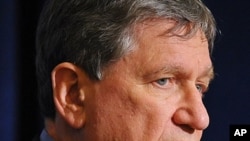The U.S. special representative for Afghanistan and Pakistan, Richard Holbrooke, recently traveled to Asia as well as to Georgia and Germany. Holbrooke said Tuesday that he sees positive shifts in Afghanistan and Pakistan.
Last month, Holbrooke wrapped up his second trip to South Asia this year, and his first visit to Central Asia since President Barack Obama appointed him to his post.
Holbrooke told reporters at the State Department that he sees positive developments in Afghanistan and Pakistan, to the point that his chief concern in Pakistan is not extremism. "I think that in Pakistan and in Afghanistan, but particularly in Pakistan, there has been a movement, a shift in sentiment here. In Pakistan right now, my greatest concern is to help the Pakistanis with their economic and energy problems," he said.
Holbrooke said the increased pressure on the Taliban on both sides of the border appears to be having a positive effect in the region. He added that reports from NATO's force in Afghanistan back up this notion. "ISAF [the International Security Assistance Force] is reporting more and more people contacting them and saying, 'We want to talk about separate peace arrangements," he said.
Holbrooke highlighted the capture of senior Taliban leaders, the Pakistani army's success in battling the Taliban in South Waziristan and the offensive to push the Taliban from southern Afghanistan's town of Marjah.
On the subject of Marjah, Holbrooke said the focus is shifting from military operations to efforts to rebuild the region without corruption. He said it is a large order that the United States is committed to carrying out.
"Remember it is clear, hold, build and transfer. The 'clear' phase was always going to be relatively easy, and the casualty rate was very low. The 'hold' phase is a transitional phase, in my view. It is the 'build' and 'transfer' that is the test of our policies - build and transfer. And that is what we are testing," he said.
Holbrooke praised Georgia's commitment to the war in Afghanistan, saying that Georgia appears to have the highest per capita troop contribution of any country in the world. "They have a tremendous fighting tradition and they are going into Afghanistan with no national caveats [i.e., constraints on the degree of their engagement]. And after they unpack and get acclimatized, they will be integrated into the Marine operations in Helmand," he said.
Next month, Holbrooke said, there will be about 950 Georgian troops in Afghanistan.
With this trip, the U.S. envoy said he has traveled to and met with the leadership of most of Afghanistan's neighbors.
"In the case of Kyrgyzstan, which does not have a common border with Afghanistan, [there is] the very important Manas transit center, which we will renew the arrangements on in the next few weeks. And I wanted to launch that process," he said.
A year ago, the Kyrgyz government announced plans to terminate the agreement that allows the United States access to the Manas air base. Months later, the two countries reached a deal that allows the U.S. to stay at Manas in exchange for $60 million a year in rent -- more than three times what it paid in the past.
Holbrooke said he discussed northern supply routes to Afghanistan while he was in Uzbekistan and Tajikistan, and rail transit while in Kazakhstan.
The U.S. envoy also pointed out that Tajikistan's vast water resources could ease water shortages in Pakistan and Afghanistan.
Holbrooke noted that it was a logistical communications failure that prevented him from landing in Turkmenistan, the only country in the region that he did not visit on his trip.









